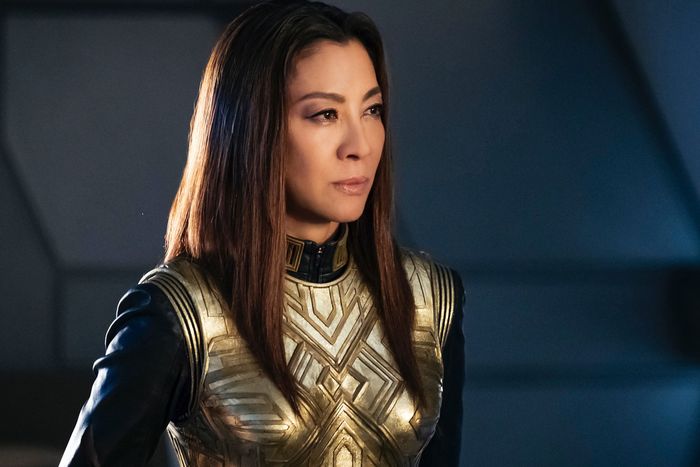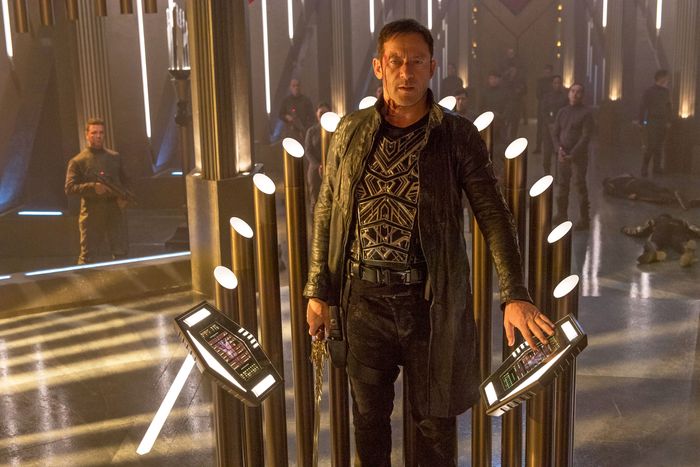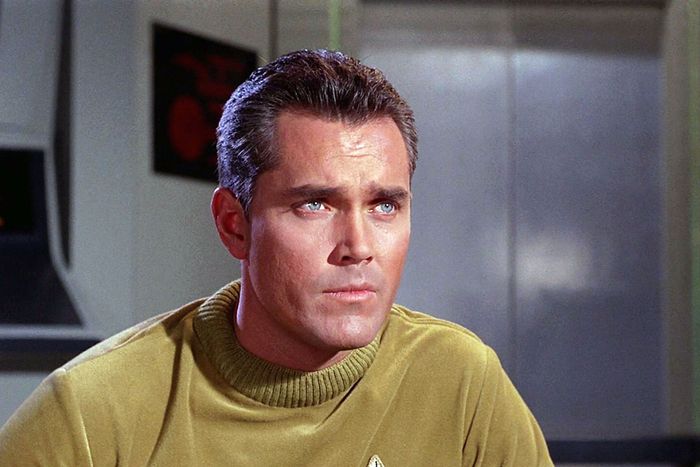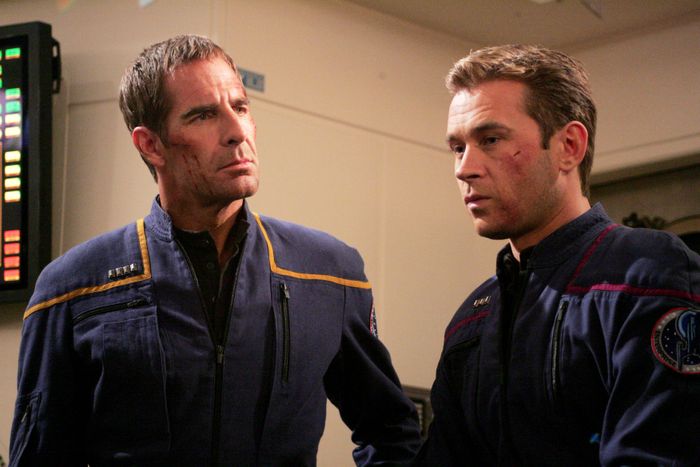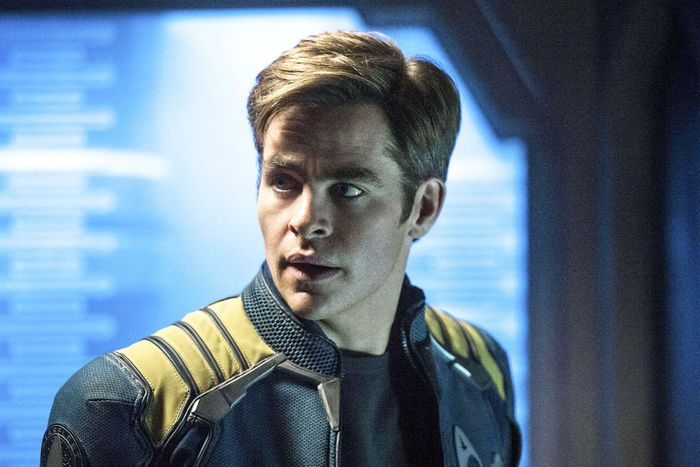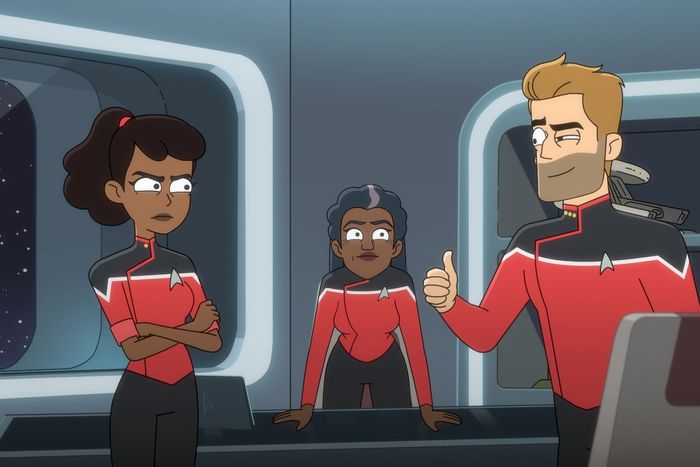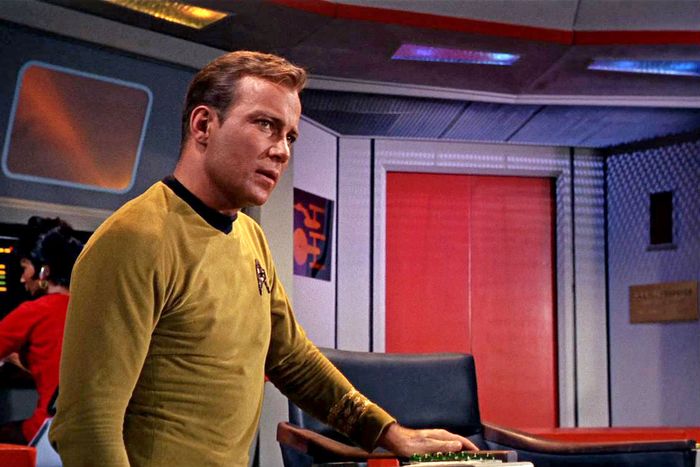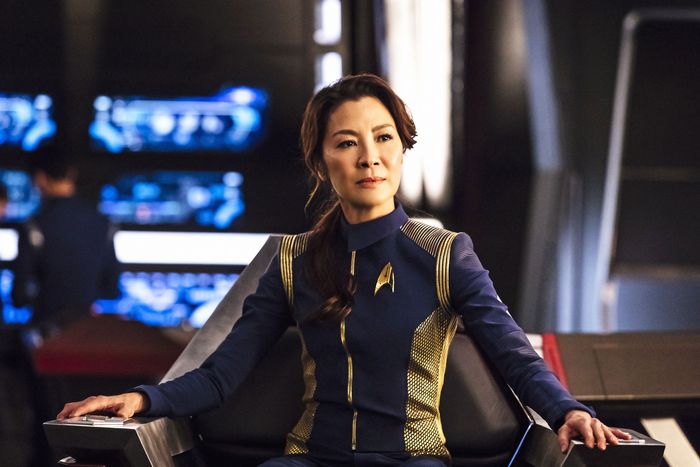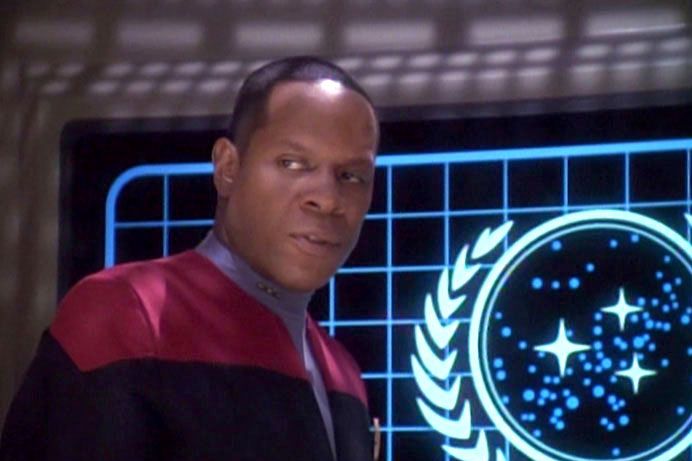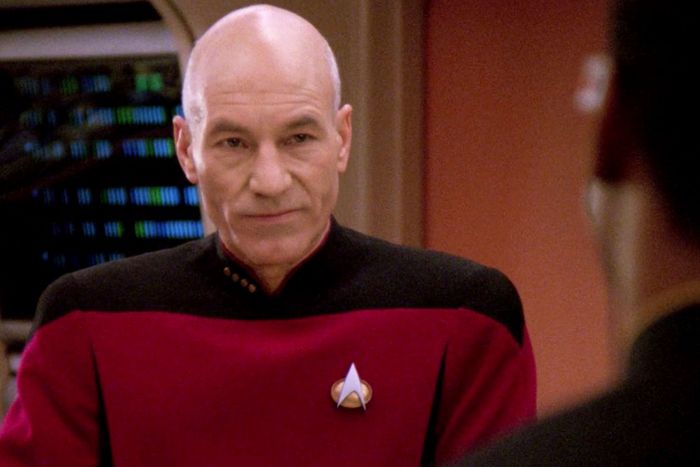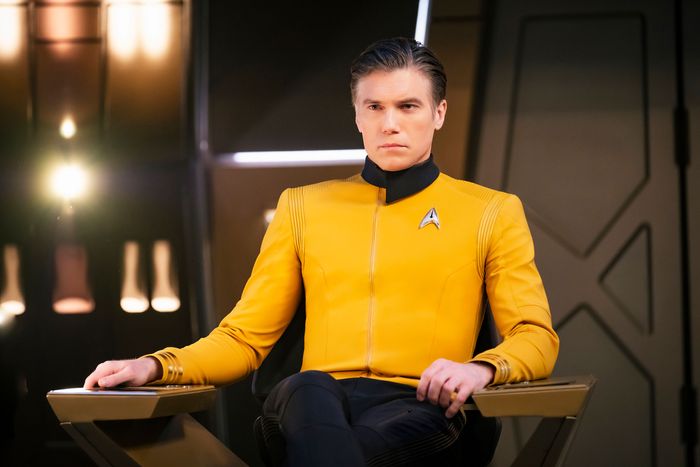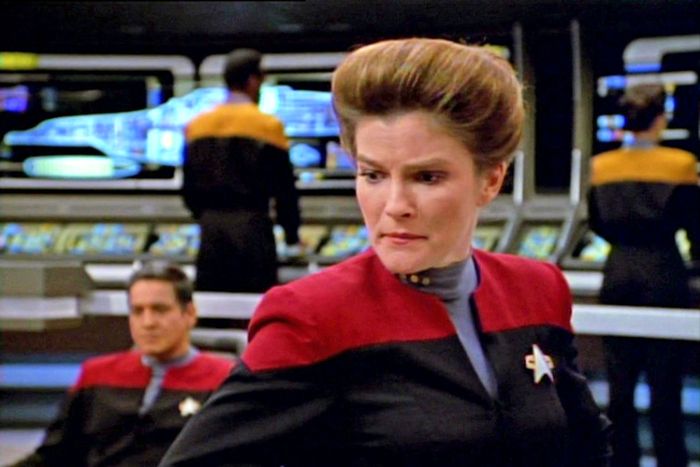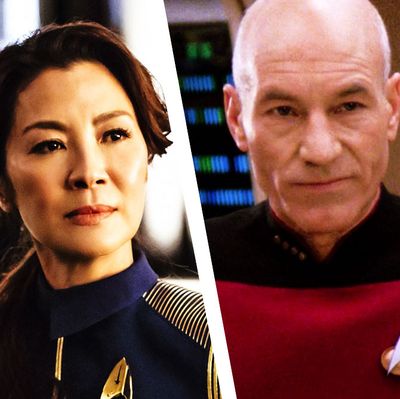
It’s impossible to be objective when selecting your favorite Star Trek captain. It requires making a call wrapped up in sentiment and timing. Which captain did you first encounter? Which one best reflected back to you the person you wanted to be? It’s easier to try to attempt a clear-eyed consideration of which one would be the best boss. Sure, there are captains sure to take you on wild adventures, but would you enjoy the ride if your life depended on their decision-making? On the flip side, there are captains that could get the job done without really inspiring that much enthusiasm, the Starfleet equivalent of a decent boss who clearly spends the back half of every shift with an eye on the clock.
It’s a worthwhile thought exercise, and one at the heart of Star Trek: Discovery, which focuses not on a captain but Michael Burnham (Sonequa Martin-Green), a science officer struggling to work her way back from a snap judgment that ended with her in disgrace. Burnham has so far served under several captains, and the series has depicted the effect this has had on both her and the officers around her. (And, thus, has more entries below than any other version of Trek.) We considered the captains featured in various film and TV branches of the Star Trek universe, including Star Trek: Lower Decks’ animated captain, and tried to rank them based on who would provide the best work experience — and who would be most likely to bring you back home in one piece.
12. Captain Philippa Georgiou, Mirror Universe (Michelle Yeoh)
Seen in: Star Trek: Discovery
Managerial style: Imperious and unforgiving, though that description is complicated by the fact that being imperious and unforgiving is baked into her main mirror universe job as emperor of the Terran Empire. (Or, more accurately, her job as Imperial Majesty, Mother of the Fatherland, Overlord of Vulcan, Dominos of Qo’noS, Regina Andor, Philippa Goergiou Augustus Iaponius Centarius.) There, she fought for and won the top spot in a kill-or-be-killed system in which might makes right, and deception and backstabbing are the norm; to that end, she expects those working under her to understand the rules of the game. In other words, she’s awful. But, on the other hand, she really seems to enjoy being awful, not to mention the fringe benefits of having clawed her way to the top (fine food, sex slaves, etc.). Those who can get on her murderous wavelength might also have a good time — for as long as it lasts.
Key career moment: When the always adaptive Emperor Georgiou made her way from the mirror universe to the prime Star Trek universe she used the opportunity to save the day after getting thrown into a battle between the Federation and the Klingons. But this wasn’t a simple heel-face turn; as always, it was more a matter of calculation than altruism. The move won her freedom from those who knew her true origins and earned her a spot in the Federation’s super-secretive deep-state operation Section 31. What could possibly go wrong?
Would she be a good boss? Put simply, working for this Philippa Georgiou, at least in the mirror universe that made her, would mean constantly fearing for your life as part of a pitiless, fascist organization hell-bent on conquering the universe with little regard for its employees’ quality of life. (Actually, when it’s all spelled out like that, it sounds like a pretty easy transition from corporate America.)
11. Captain Gabriel Lorca (Jason Isaacs)
Seen in: Star Trek: Discovery
Managerial style: In a word, cryptic. After she’s accepted aboard the Discovery following her mutinous turn against her mentor Captain Georgiou (the prime universe one, not the evil dictator; more below), Michael Burnham spends much of Discovery’s first season trying to figure out what’s up with her new captain, a man fond of fortune cookies and averse to bright lights and chairs. Pro: Lorca took a chance on her when no one else would. Con: He also seems kind of evil. That likelihood aside — and it’s eventually revealed that, spoiler ahead, he made his way to the prime universe from the mirror universe after somehow taking the original Lorca’s place — he commanded the Discovery with curiosity, a sure hand, and an apparent sense of fairness. Shame about all the murder and scheming.
Key career moment: The season one episode “Into the Forest I Go” captures every side of Captain Lorca as he bravely goes into battle against Klingons, questionably decides to risk the health of a crew member (and with him, the whole crew) to win the battle, then takes everyone into the mirror universe to further his scheme of galactic conquest. It’s quite a journey, and one that reveals his true self at the end.
Would he be a good boss? No, but serving under Lorca would never be boring.
10. Captain Christopher Pike (Jeffrey Hunter)
Seen in: Star Trek: The Original Series
Managerial style: Glum as hell. Some behind-the-scenes info: Jeffrey Hunter’s Captain Pike was supposed to be the protagonist of the original Star Trek series. NBC passed, but gave Gene Roddenberry the unusual opportunity to make a second pilot, this one featuring the now-familiar classic series cast (with only Leonard Nimoy’s Mr. Spock sticking around). But Roddenberry wasn’t done with Pike or the original pilot. It became central to the two-part episode “The Menagerie,” which recounts Pike and the Enterprise’s adventures on Talos IV, home to the Talosians and their reality-bending psychic powers. Hunter’s a fine actor, but it’s not hard to see why NBC was reluctant to green-light a series focusing on Pike, who’s introduced complaining about the burden of command. “You bet I’m tired,” he tells the ship’s doctor. “Tired of being responsible for 203 lives. Tired of deciding which mission is too risky and which isn’t and who’s going on the landing party and who doesn’t. And who lives … and who dies.” He sounds ready to boldly curl up in a fetal position.
Key career moment: The signature moment for this incarnation of Pike comes at the end of the episode when, having been burned and disfigured beyond recognition, he’s allowed to return to Talos IV and live out his days in the unreal paradise he rejected years before, even though he already seemed pretty much over reality as we know it from the start.
Would he be a good boss? Spock and the others seem to respect him, so perhaps his doubts don’t interfere with his ability to command, even if working under him seems like it would make for a pretty weary trudge through the cosmos.
9. Captain Jonathan Archer (Scott Bakula)
Seen in: Star Trek: Enterprise
Managerial style: Archer’s chill, which is both his greatest strength as a leader and occasionally his greatest weakness. A former Boy Scout, lifelong water-polo enthusiast, and caring dog owner, Archer sometimes seems like he’s happy enough to be exploring the stars but might be even happier if he was just hanging out and shooting the breeze with some pals. This might be more impression than reality; Star Trek lore has him going on to become a decorated admiral and to be regarded as one of the greatest explorers in the early days of Starfleet and he certainly does a lot of exploring during the show’s four-season run. But Scott Bakula rarely plays him as a man who has greatness in his future. Archer usually seems a little annoyed that the Enterprise’s adventures have cut into his downtime. He’s not as melancholy as Jeffrey Hunter’s Captain Pike, but he occasionally seems just as checked out. Nonetheless, he was always good in a crisis, and could be a surprisingly shrewd diplomatic. It just always seemed to take a major event to stir his interest.
Key career moment: In the second-season episode “A Night in Sickbay,” Archer hangs out with his ailing dog Porthos when he should be tending to his diplomatic duties. It borders on dereliction of duty, even if it is pretty endearing. It’s also a pretty good encapsulation of how Archer’s mind works.
Would he be a good boss? Sure. Probably. Why not? He’d be okay enough.
8. Captain James T. Kirk (Chris Pine)
Seen in: Star Trek, Star Trek Into Darkness, Star Trek Beyond
Managerial style: If you like predictability, order, rules, regulations, and military precision, the last place you’d want to be is the Kelvin Universe Enterprise under the command of James T. Kirk. Chris Pine’s just-getting-started Kirk is young, impetuous, and brilliant — but mostly young and impetuous. It’s smart work, playing like the Kirk we know from the original Star Trek run before any of the rough edges had gotten sanded off. Pine’s Kirk is a lot of fun to watch, but it also seems like serving under him would be terrifying most of the time.
Key career moment: Forced to choose between rescuing an alien race and violating the Prime Directive in the opening scenes of Star Trek Into Darkness, Kirk barely seems to consider it a choice at all. It’s just the first of many times he breaks the rules over the course of the film (plus its predecessor and successor). Sure, it all works out (even if Kirk does briefly wind up dead later in the movie), but it could have gone horribly wrong. This Kirk commands from the gut, occasionally while listening to Beastie Boys. He’s cool and fun, but…
Would he be a good boss? … Do you really want to work for a Starfleet captain best described as “cool” and “fun” while exploring the furthest reaches of a dangerous universe?
7. Captain Carol Freeman (Dawnn Lewis)
Seen in: Star Trek: Lower Decks
Managerial style: Directness defines Captain Freeman’s command style. She knows exactly what she wants and she’s not afraid to ask for it, sometimes forcefully. She’s no-nonsense but not in a power trip–y way. She just wants things to run smoothly even if experience has taught her that it never does. (Or, at least it never does onboard the second-tier U.S.S. Cerritos, the California class starship she commands.)
Key career moment: Commanding a ship on which her gifted-but-rebellious daughter, Beckett Mariner (Tawny Newsome), is serving as an ensign has been a continual challenge for Captain Freeman, forcing her to balance her duties as captain against her concerns as a mother. She’s mostly opted to model good behavior for her daughter by following the rules of Starfleet. In Lower Decks’ third-season premiere, Mariner and her pals take desperate, and illegal, measures to clear Captain Freeman of a crime she’s been wrongly accused of. Ultimately, the system works, making Mariner’s misadventures unnecessary. Mother/Starfleet knows best.
Would she be a good boss? Probably. She’s terse but fair and clearly knows what she’s doing. But as the head of a ship prone to animated high jinks, it’s tough to judge Captain Freeman against other Star Trek captains. Her informed, steady-handed command doesn’t always work in her favor when dealing with some of the cartoonish absurdity the Cerritos keeps encountering. On the other hand, nothing truly terrible ever happens to those under her command, so serving on the Cerritos would likely be one of Starfleet’s safer assignments.
6. Captain James T. Kirk (William Shatner)
Seen in: Star Trek: The Original Series, Star Trek: The Motion Picture, Star Trek: Generations
Managerial style: You’re probably better off working for the slightly older Kirk played by William Shatner in Original Series and its accompanying film series. (Okay, he’s significantly older in the film series.) This Kirk hasn’t lost the spirit evident in the younger Kirk, only it’s now tempered — at least a bit — by experience. Working for this Kirk isn’t without dangers of its own, particularly if you’re wearing a red uniform. He’s perfectly willing to send an away team into danger. Just as often, however, he’s the one leading the team, and it’s hard to underestimate the esprit de corps created by a leader willing to put himself in harm’s way mission after mission. Prepare to work hard, and maybe die, but feel like you’re part of a mission that could change the universe for the better.
Key career moment: Prepare also to listen to speeches. Kirk is a man of action and a man of romance, but above all, he’s a man of ideals who’s willing to go to great lengths to protect those ideals. But first, he’ll try to persuade his opponents with words. In “The Omega Glory,” for instance, Shatner’s Kirk lectures the primitive residents of a planet whose development paralleled Earth until it took a wrong turn on the glories of the U.S. Constitution, and he does it one emphatic syllable at a time: “We. The People …” Etc.
Would he be a good boss? Chances are you’d love working for Kirk up to the moment he got you killed.
5. Captain Philippa Georgiou, Prime Universe (Michelle Yeoh)
Seen in: Star Trek: Discovery
Managerial style: Collegial but firm, the prime universe Georgiou might rank even higher on this list if we had a large sample of what she was like as a captain. In the early episodes of Discovery she appears to be competent, respected, quick on her feet and close to her crew, especially Michael Burnham.
Key career moment: But not apparently close enough to stop Burnham from committing a mutinous act that she deems necessary to prevent a war with the Klingons. Whether this is a failure on Georgiou’s part — a missed chance to take a key suggestion from a subordinate — or overzealousness on Burnham’s remains a question left open by Georgiou’s subsequent death.
Would she be a good boss? It seems like she would, especially since her death continues to haunt Burnham throughout the series. On the other hand, maybe listen to your trusted shipmate when she says she knows what she’s talking about?
4. Captain Benjamin Sisko (Avery Brooks)
Seen in: Star Trek: Deep Space Nine
Managerial style: Firm, fair, and perpetually distracted. Burned out on Starfleet life after losing his wife in the Battle of Wolf 359, Sisko only reluctantly takes command of Deep Space Nine, a space station located close to a galactic hot spot near a wormhole and, until shortly before he assumed command, ruled by the Cardassians. But Sisko soon finds himself drawn into the leadership of the station and the politics of the region when the spiritual leader of nearby Bajor names him the Emissary of the Prophets. It’s all a lot to balance, even before new adversaries start to show up from the Gamma Quadrant — and on top of it all, Sisko has to serve as a single father to a teenage son. Maybe that’s why he sometimes seems so overworked. He’s a fine, inspiring leader, but he also has a lot on his plate, running a space station while also acting as the first line of defense against enemies known and unknown — and maybe serving as messiah to a whole race of people. Many Deep Space Nine stories require Sisko to be reactive rather than proactive, whether dealing with a tavern keeper running a black market under his nose or the outbreak of a full-scale war. Strong and competent, Sisko could handle anything, but the series made him handle an awful lot.
Key career moment: Deep Space Nine introduced shades of moral grayness to Star Trek only suggested by its predecessors, never more than in the course of the protracted Dominion War arc, a dangerous conflict in which Sisko sometimes had to cheat and bend the truth for the greater good. Brooks’s performance always suggested that Sisko did a lot of soul-searching before making any decision, but once made he never looked back, the mark of a strong leader if ever there was one.
Would he be a good boss? Chances are that, apart from the occasional curt acknowledgment, you might only talk to him once or twice as he moved from one crisis to another. Still, you’d end up respecting the hell out of Sisko.
3. Captain Jean-Luc Picard (Patrick Stewart)
Seen in: Star Trek: The Next Generation, Star Trek: Generations, Star Trek: Nemesis, Star Trek: Picard
Managerial style: Picard manages like a benevolent but firm god. Speaking in an authoritative voice (the accent helps), his every directive sounds as if handed down from above. But there’s a difference between having the trappings of authority and having the record to back it up, and from his first outing on the Enterprise — in which the decision to separate the starship’s saucer section showed just how many lives were depending on him making the right choices — he makes it clear how seriously he took his job and how seriously he expects others to take theirs.
Key career moment: In some respects, the definitive Picard moment can be found in Star Trek: The Next Generation’s final episode, “All Good Things …” in which Picard, for the first time, joined his senior staff for their regular poker game, with an expression of regret that he’d never gotten around to it before. Except in rare moments, Picard always holds himself at a distance as captain, even if Stewart’s performance always emphasizes the complex, passionate human beneath the commanding exterior. He stays remote by design and it worked, but that choice isn’t without consequences.
Would he be a good boss? Picard would be an awe-inspiring boss in every sense. You’d learn a lot working with him, even if you never felt like you truly knew him.
2. Captain Christopher Pike (Anson Mount)
Seen in: Star Trek: Discovery, Star Trek: Strange New Worlds
Managerial style: In sharp contrast to Hunter’s Pike, Anson Mount plays Christopher Pike as a man who’s just happy to be out among the stars with shipmates he considers to be more like friends than co-workers. Where on Discovery, Pike was reminiscent of a cool camp counselor who just wants everyone to have a good time — as long as they follow the rules and listen to his orders — Strange New Worlds has layers of soulfulness and empathy only glimpsed before. (Maybe learning you’re headed to a horrific fate does that?) In moments of crisis, Pike comes off as unshaken but commanding, and willing to use force against his enemies when necessary. He’s easygoing until circumstances force him to be otherwise. Then he’s not. He carries himself around his crew with authority while still radiating concern. This is a self-assured, modern captain who cooks an amazing gumbo and doesn’t worry that his subordinates will lose respect if they see him wearing an apron.
Key career moment: In Strange New Worlds’ first-season finale, Pike believes he’s found a workaround to avoid the accident in which he’ll sacrifice his well-being to save others. Then Pike is visited by an older version of himself who confirms that, yes, he can escape maiming before taking the captain on an It’s a Wonderful Life–like tour of the future created by his attempt to escape his fate. It’s not pretty and it means others will suffer in his place. So, of course, he resigns himself to his destiny without telling anyone. Always the greater good with this guy.
Would he be a good boss? Working for Pike seems like a dream, honestly. He seems like the kind of boss who’d teach you new skills and then suggest unwinding with a game of ping-pong that he wouldn’t try all that hard to win (though he totally could if he wanted to). Two seasons into Strange New Worlds, and the series keeps revealing new layers of competence and compassion. Call him No. 2 with a bullet (or a phaser blast, if that makes more sense).
1. Captain Kathryn Janeway (Kate Mulgrew)
Seen in: Star Trek: Voyager
Managerial style: Democratic, at least up to a point. Forced to navigate an unexplored quadrant of the galaxy while commanding a crew made up of enemies forced to work together in an attempt to find their way home, Janeway has the highest level of difficulty of any of the captains on this list. She rises to the occasion by hearing out all points of view, reconciling opposing stances when possible, working toward compromise, then ultimately making an informed decision after listening to her crew. Stuck in an impossible situation, she stays coolheaded and thoughtful no matter how trying the circumstances become.
Key career moment: The biggest challenge faced by Janeway and the Voyager crew comes not in the form of hostile races or dwindling supplies — though those don’t help — but from the many moments that invite them to abandon their principles. In the second season’s “Alliances,” Janeway seeks a way to sidestep conflict with the Kazon (sort of the Gamma Quadrant’s dollar-store version of the Klingons). She considers first an alliance with a Kazon faction, then teaming up with the Trabe, a seemingly much more civilized race. Then, despite the wishes of a faction of her officers, she ultimately rejects both choices when she learns the Kazon can’t be trusted and that the Trabe are just as bad in their own way. It might mean taking longer to get back home, or maybe never getting home at all, but she remains determined that her crew hang on to their best selves no matter what.
Would she be a good boss? Yes. Janeway would be the sort of boss you might have to complain about behind her back, but she’s also the sort of boss you’d end up naming your first child after.


